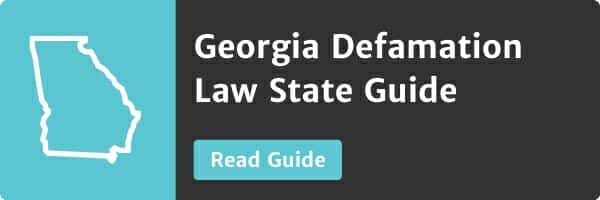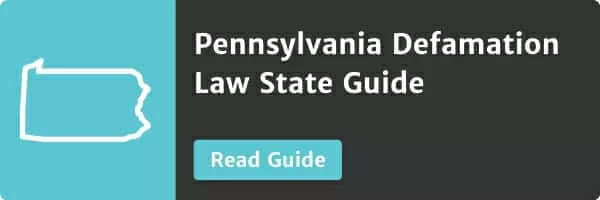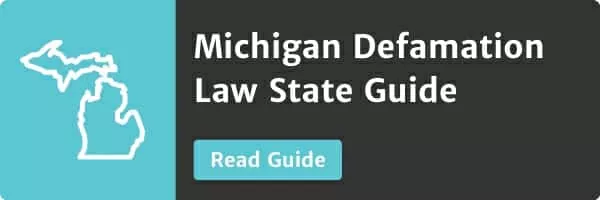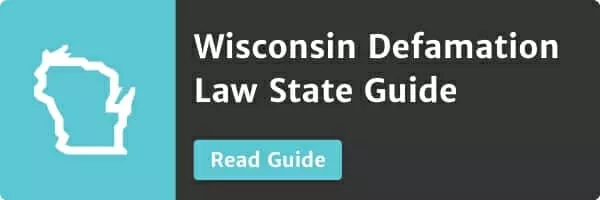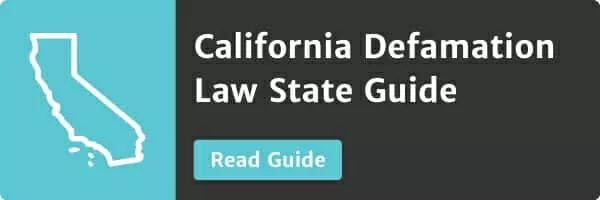
The Minc Law Guide to Nevada Defamation Law
This page has been peer-reviewed, fact-checked, and edited by qualified attorneys to ensure substantive accuracy and coverage.
What is Defamation? Nevada’s Definition of Defamation
Defamation is defined as the overarching legal term for the written, spoken, or published false assertion of fact to a third-party, which ultimately results in damage or injury to another party’s reputation. The United States and other Common Law legal jurisdictions (think Australia, Canada, United Kingdom), classify defamation as a civil wrong, as such, it may more aptly be referred to as the “tort of defamation” or “defamation of character.”
Due to the tort of defamation being a civil wrong, United States defamation plaintiffs may recover damages for the injury and harm suffered as a result of the false and defamatory statement published.
Specifically, defamation of character may be broken down into two core types, libel and slander, both of which are extremely important to familiarize yourself with due to the differing formalities and requirements surrounding bringing a claim for each.
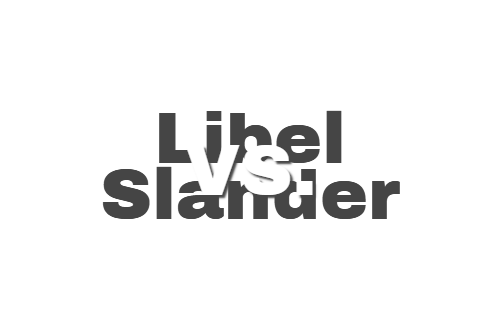
What is Libel?
Libel is defined as the written or published (videos, photographs, other media) false statement of fact to a third-party, which subsequently causes injury or harm to another party’s reputation.
Due to the rise of the Internet and the popularity of user-generated content platforms (Facebook, Reddit, Twitter), libel has become the most prevalent and popular form of defamation being litigated in the U.S. judicial system.
What is Slander?
Slander is defined as the spoken communication of a false statement of fact to a third-party, which subsequently causes injury or harm to another party’s reputation.
The general public oftentimes confuses both slander and libel, and incorrectly uses “slander” as the all-encompassing term for all types of defamation. While this may not seem like that important of a distinction to make, it actually is, and may impact a defamation plaintiffs’ rights and recourse significantly.
Note that most U.S. states have varying formalities and requirements for both libel and slander claims, and failing to understand the difference between the two could result in being barred from bringing your claim altogether.
Furthermore, as slander is the spoken communication of a false assertion of fact, evidence may be fleeting or easily forgotten, therefore slander plaintiffs are generally required to bring their claims within a shorter time period than libel plaintiffs.
So, what are some other names for the tort of defamation?
The tort of defamation may also be commonly referred to as:
- Calumny,
- Vilification,
- Traducement,
- Character assassination, &
- Disparagement.
Keep in mind that “disparagement” is actually a misnomer for the tort of defamation, as it refers to a person or organization who harms the financial and proprietary rights of a business or company, rather than the reputation of a person. Disparagement may be more aptly called, “the tort of commercial or business disparagement.” To read up further about this tort, the policies behind it, how it differs from defamation, and how to bring an action for business or commercial disparagement, check out our comprehensive article here.
What do you call someone you publishes or communicates a defamatory statement?
There’s several names you may use to refer to someone who commits defamation, including:
- Defamers: the general term for persons who publish or communicate defamatory statements to a third-party.
- Slanderers: the term for persons who verbally communicate a defamatory statement to a third-party.
- Libelers: the term for persons who publish (via writing, media, photographs, etc…) a defamatory statement to a third-party.
- Famacide: a rather old and archaic term for persons who literally “destroy another person’s reputation.”
Now that we’ve taken you through the general definition of defamation and the various names for persons who commit defamation in the United States, let’s take a look at how Nevada defamation law defines defamation of character and the tort of defamation, along with the requisite elements a defamation plaintiff must prove in order to succeed in their libel or slander action.
Nevada’s Definition of Defamation & Required Elements
Under Nevada defamation law, defamation is defined as “[Under any reasonable definition, such charges would tend to lower the subject in the estimation of the community and to excite derogatory opinions against him and to hold him up to contempt.” In Nevada, defamation will include both libel and slander.
In order for Nevada defamation plaintiffs to succeed in their libel or slander action, they must prove the following four (4) elements:
- A false and defamatory statement concerning another;
- An unprivileged publication to a third-party;
- Fault amounting at least to negligence on the part of the publisher; &
- Either actionability of the statement irrespective of special harm, or the existence of special harm caused by the publication. People for the Ethical Treatment of Animals v. Bobby Berosini, Ltd., 895 P.2d 1269, 1272 (1995) citing Restatement (Second) of Torts § 558 (1965).
Note that publication to anyone other than the person being defamed, even to their agents, satisfies the publication element when making the prima facie case for defamation in Nevada. Jones v. Golden Spike Corp., 623 P.2d 970 (1981).
Let’s take a look at two examples to help explain defamation in Nevada further.
- Televised debate: During the Nevada Republican gubernatorial primary, during a televised debate, the moderator asked about a bounced check from one of the candidates, which was ultimately considered defamatory under Nevada defamation law.
- Deadly plastic surgeon: A doctor who told an exotic dancer that a plastic surgeon she was considering for an operation had killed a woman while operating on here, was found to have committed defamation in Nevada.
Note that the above two examples deal with false assertions of fact, or statements which may be independently verified as true or false, a core requirement for defamation in the United States and Nevada.
Furthermore, “The communication to one spouse of a matter that would be defamatory to the other spouse constitutes a publication.” Restatement (Second) of Torts § 577 cmt. J (1977) cited within Jake Lee & Sun v. Soon Yi Lee, 2016 Nev. Dist. LEXIS 1964.
In this all-encompassing blog post, we’re going to address all four core elements comprising a Nevada defamation claim, along with various defenses, and the damages associated with defamation claims in Nevada.
Defamation Removal Tip: Document everything. Screenshotting libelous and defamatory material is an effective way to strengthen your claim for online defamation. Furthermore, reach out to a trusted friend or family member to also help document the offensive material, doing so will help rebut any claims you tampered with the evidence.
Are you a resident of Nevada and have been the victim of libelous or slanderous attacks against your reputation? Reach out to the experienced defamation removal lawyers of Minc Law today! We’re here to protect and fight for your reputation.
At Minc Law, we boast a nearly 100% online defamation takedown and removal rate, have removed over 25,000 pieces of malicious and libelous content in our tenure, and charge a flat, reasonable fee to do so. Furthermore, we’ve litigated in over 19 states and 3 countries, so rest assured when working with Aaron Minc and the defamation lawyers of Minc Law, you’re in good hands.
With United States defamation law being a highly complex and nuanced area of law, we strongly recommend you contact an experienced internet defamation attorney to explain your legal options today!
To schedule your free, initial no-obligation consultation with an intake specialist, call us at (216) 373-7706 or schedule a meeting online!
The online abuse stops now!
Now that we know how Nevada defines defamation, what exactly do Nevada libel and slander plaintiffs need to plead in order to succeed in their defamation action?
Nevada’s Defamation Pleading Standard
Before we tackle Nevada’s defamation pleading standard, let’s first take a look at what exactly pleadings are and why our judicial system requires both plaintiffs and defendants file such with the court. Surely, if you’ve ever watched a legal television drama, such as ‘Law and Order’ or ‘Suits,’ then you’ve probably heard one of the following pleading terms.
First, what are pleadings?
Pleadings are essential for a legal claim, and without it, the claim itself would likely cease to exist. Specifically, pleadings are required formal statements and documents which must be filed with the court, which outline:
- Both parties and their issues,
- Statement of facts,
- Claims and defenses, &
- Other relevant information to the action.
Pleadings must be initiated by the plaintiff, otherwise there wouldn’t likely be any action or claim at all. Think about it, why would a defendant choose to bring a claim against themselves? After a plaintiff initiates the action and files their pleadings, the defendant will then respond and file their own set of pleadings.
So, what are several examples of documents used in pre-trial pleadings?
- Complaint: the first or initial pleading set forth by the plaintiff and filed with the court, outlining their core claims, issues, facts, and other relevant details. Furthermore, complaints typically contain a “prayer for relief,” which is just a fancy saying for a statement noting the damages suffered and sought.
- Answer: the defendant’s answer to the plaintiff’s initial complaint, addressing all claims, issues, facts, and other relevant details established and argued by the plaintiff. Additionally, a defendant may raise any pertinent defenses they will be relying on in order to skirt liability.
- Reply: the plaintiff’s response to the defendant’s answer, as the defendant may have raised new claims, issues, facts, or defenses.
- Counterclaim: the defendant’s assertion of any other legal claims or arguments against the plaintiff, which are typically brought to offset the plaintiff’s complaint and initial claim.
Every U.S. state has their individual pleading requirements for all legal actions, therefore we strongly recommend you consult an experienced defamation removal attorney in order to assist you in identifying the proper documents you need to bring your claim.
With a highly clogged and complex legal system, it’s essential to understand that most U.S. states will substantially differ in their pleading requirements and formalities.
For example, one state may require libel plaintiffs to commence their action within a certain period of time, while another state may have a more relaxed timeframe for a libel plaintiff to bring their action. Furthermore, some states may require defamation plaintiffs to argue and plead their defamation action with a high degree of specificity or with particular language, while other states may only require a defamation plaintiff to produce the allegedly defamatory statement and nothing more.
What defamation pleading standard does the state of Nevada follow?
Nevada is a notice pleading state, meaning that Nevada defamation law only requires a short and plain statement for pleadings.
Note that the notice pleading standard is the most common form of pleading in the United States and all relevant information surrounding the case at hand is addressed in the process of discovery – the pre-trial procedure where parties obtain and exchange evidence from one other.
Notice pleading has also been criticized due to the leniency surrounding a party’s statements, and it is not uncommon for drafted complaints to be poorly worded or ambiguously phrased, coupled with non sequiturs and baseless assertions.
Let’s now take a glance at certain types of statements United States’ defamation law and Nevada defamation law have ruled to be so inflammatory and inherently defamatory, that a defamation plaintiff need not prove damages. This is commonly referred to as ‘defamation per se.”
Nevada Defamation Per Se: What Types of Statements are Considered ‘Per Se’?
Also known as ‘libel per se’ and ‘slander per se’ (depending on the medium in which the defamation is conveyed), defamation per se is a legal principle which classifies certain types of statements as so inherently inflammatory and defamatory, that a plaintiff need not actually prove they suffered damages.
Specifically, Nevada defamation law defines speech as ‘per se’ if it falls into one of the below four (4) categories:
- Imputations that the plaintiff has committed a crime
- Imputations that would injure the plaintiff in their trade, business or office
- Imputations that the plaintiff has contracted a loathsome disease
- Imputations of unchastity in a woman or sexual misconduct by either gender.
Let’s take a look at several Nevada defamation cases where courts ruled on the principle of defamation per se.
- Blackmail: The terms “blackmail” and “black market” were held to be defamatory per se in Nevada in a 1958 case
- Marital affair: Telling a man’s wife that he was having an affair was held to be defamatory per se. Jake Lee & Sun v. Soon Yi Lee, 2016 Nev. Dist. LEXIS 1964 (Clark County. 8th Judicial Dist. Ct. Nev. July 21, 2016)
- Handcuffing & questioning: It is considered defamation per se to handcuff and question a suspected shoplifter in front of other people.
Generally, most U.S. states recognize the above four classifications of ‘per se’ statements, and will “presume” damages in cases where a “per se” statement is found. We will address the most popular types of damages associated with libel and slander actions in the United States and Nevada in Section 5: Nevada Defamation Damages.
What is Defamation Per Quod?
On the flip side of the coin is the legal principle of defamation per quod, which does not presume damages and requires libel and slander plaintiffs to provide extrinsic and supporting evidence to prove a statement’s defamatory nature.
As defamation per quod does not presume damages, plaintiffs must plead and prove “special damages,” which will also be addressed in Section 5.
Nevada defamation law considers speech ‘per quod’ when the speech alone would not be defamatory, but the defamation arises from extrinsic circumstances or the context of the speech.
As of date of publish, Nevada has not had any cases where speech has been held to be ‘per quod’ defamatory.
Defamation By Implication: Not All Defamation is Explicit
Sometimes in libel or slander actions, defendants don’t always come out and explicitly make or publish a defamatory statement, and may disguise or cloak a libelous or slanderous statement in everyday speech. Such gives rise to the legal principle of defamation by implication.
Under Nevada defamation law, trial courts must look at the context surrounding the statements that are being alleged as defamatory. Such context pertains to the:
- Implications,
- Insinuations, &
- Innuendos of the person(s) making the alleged defamatory statements.
Online Defamation Law Fact: It’s important to understand that when bringing an online defamation action, your best bet of legal action and recourse isn’t against the website or ISP where the information was posted. So who can I bring an action for online libel and defamation against? The individual poster. Consult an experienced defamation attorney to assist you in identifying and uncovering the malicious online defamer or troll.
If you are still confused about what exactly is classified as libel or slander and have been the victim of malicious or offensive online attacks, contact the experienced defamation removal attorneys of Minc Law today!
Call us at (216) 373-7706, or fill out our contact form online!
We’re here to fight for your reputation.
Important Nevada Defamation Law Formalities & Requirements
As you can see, United States and Nevada defamation law is quite complicated and highly nuanced, boasting countless hurdles and hidden filing formalities and requirements. In this section, we’re going to address the essential defamation formalities and requirements in Nevada. For example, we’re going to walk you through:
- Whether Nevada courts have personal jurisdiction over out-of-state defamation defendants
- Where Nevada defamation plaintiffs can sue defendants
- The statute of limitations governing a plaintiff’s time to bring their defamation action
- Plenty more
For starters, let’s get into Nevada courts and their jurisdictional reach over out-of-state defamation defendants.
Do Nevada Courts Have Personal Jurisdiction Over Out-of-State Defamation Defendants?
Simply put, yes. However, there are some caveats.
Nevada has applied the Calder holding in previously in the case of Laxalt v. McClatchy, noting that a Nevada court can have personal jurisdiction over an out-of-state defendant if “their intentional, and allegedly tortious, actions were expressly aimed at California [or aimed at the state where the plaintiff resides].” In this case, the state would not be California, but Nevada of course.
Furthermore, in Medinah Mining, Inc. v. Amunategui, 237 F. Supp. 2d 1132 (D. Nev. 2002), a Nevada court used the sliding scale analysis for Internet cases found in Zippo Mfg. Co. v. Zippo Dot Com, Inc., 952 F. Supp. 1119 (W.D. Pa. 1997). The test reads:
“The Zippo court announced a sliding scale rule, which focuses on the level of interactivity a defendant employs through its website in doing business with a forum to determine whether the exercise of personal jurisdiction is appropriate.” Medinah Mining v. Amunategui, 237 F. Supp. 2d 1132, 1135 (D. Nev. 2002).
Ultimately, the court in Medinah Mining held that operating a passive website (a website that is available to anyone to view, but is not targeted anywhere in particular) does not subject a defendant to personal jurisdiction.
Additionally, the Nevada long-arm statute, NRS § 14.065, allows Nevada courts to hold jurisdiction over anyone as long as it is consistent with the constitutional standard.
If you’re unclear of whether Nevada states have personal jurisdiction over an out-of-state defendant who maliciously attacked and defamed you online, we strongly recommend you consult an experienced internet defamation attorney. Working with a nationally recognized online defamation attorney will not only save you time, but hassle and hardship as well.
So, now that we understand whether or not Nevada courts have personal jurisdiction over out-of-state defamation defendants, let’s take a look at which venue plaintiffs can bring their action in.
Where Can I Sue a Libel Defendant in Nevada?
Unfortunately, there are no statutes of Nevada Supreme Court cases that deal with venue for defamation cases in Nevada.
However, generally, cases are tried in the county that the defendant resides in.
For example, if a Nevada resident living in Las Vegas, commits a libelous or slanderous ac against another Nevada resident, then the case will likely be tried in Clark County (the county which Las Vegas is in).
Some U.S. states will look to where the cause of action giving rise to the claim arose, where a transaction or contract took place, or by assessing numerous other factors.
Libel Removal Tip: Looking for a free and simple way to suppress negative search results? There’s several easy and free steps online defamation victims can take to make defamatory and malicious search results less visible, including: (1) creating a blog and frequently generating positive and new content, (2) making all your social media profiles public, (3) commenting on positive content pages with your now public social media profile, and (4) interlinking all your various online accounts together.
As touched upon in Section 1, it’s crucial for defamation plaintiffs to accurately identify the form in which the defamatory statement or statements was disseminated and communicated, as it stands to significantly impact your ability to bring a claim – most notable, it affects when the statute of limitations for your claim begins to toll.
Let’s take a look at Nevada’s defamation of character statute of limitations and how it stacks up against other U.S. states.
Nevada’s Defamation Statute of Limitations Time Frame
If you’re unfamiliar with what exactly a statute of limitations is, it’s simply just a time limiting mechanism and restraint placed on legal claims, which requires plaintiffs to initiate or commence their action within a specific time.
Video: What is the Statute of Limitations for Defamation in the U.S.?

Should plaintiffs fail to file or initiate their action within the requisite time period, then they will likely be prevented or barred altogether from bringing their claim.
Or, if the statute of limitations is overlooked and they are granted an opportunity to bring their claim, then there may be a higher likelihood they have their case thrown out or dismissed.
What’s the purpose of having a statute of limitations in place?
Due to striving to create a fair and just judicial system, the U.S. legal system has numerous reasons behind the implementation and enforcement of statutes of limitations, including:
- Reasonable Diligence: Due to having an already clogged and weighed down legal system, it’s in our best interest to eliminate frivolous or non actionable claims. Depending on the nature of the claim, plaintiffs will be barred from bringing their claim if they fail to bring it with reasonable diligence.
- Preserve Evidence: In specific situations, evidence can be fleeting or destroyed. In order to prevent the chance for a one-sided case, a statute of limitations helps ensure both parties bring their claims while evidence may still be in their possession. After all, it’s not unheard of for a company or business to shred and destroy what they think to be unnecessary documents after a certain amount of time.
- Prevent More “Cruelty than Justice”: At its simplest, the U.S. legal system has statutes of limitations in place to enable defendants to receive proper notice of the case at hand. This gives them sufficient time to prepare their arguments, evidence, and case, ultimately eliminating more “cruelty than justice.”
So, what’s the statute of limitations for bringing a libel or slander action in the state of Nevada?
Under Nevada defamation law, causes of action for defamation must be brought within two (2) years of the date that the allegedly defamatory material was first published.
An important legal doctrine which affects a libel plaintiff’s ability to bring a defamation claim is the ‘single publication rule’.
Does Nevada Recognize the Single Publication Rule?
Specifically, the single publication rule is a limiting mechanism to the amount of defamation and libel claims a plaintiff may ultimately bring against a defendant. After all, a defendant shouldn’t be continually having defamation lawsuits commenced against them if they’ve already paid their dues and been sued.
Simply put, the single publication rule limits a plaintiff’s right to action and recovery to one publication. That means a defamation plaintiff may only bring one defamation action for a mass publication, and may not subsequently keep bringing actions for every following publication or dissemination of the original libelous statement.
Nevada does recognize and follow the single publication rule and has modeled their rule off the rule used both in California and New York. The original rule can be found in, Firth v. State, 775 N.E.2d 463, 464-65 (N.Y. 2002).
To see how both California and New York enforce the single publication rule, check out our New York and California defamation law state guides.
Once again, the single publication rule provides that the first time something is published, no matter how many copies are published thereafter, the day of publication is the first day the information is made available to the public. Subsequently, the publication will give rise to one cause of action and therefore on the first day of publication is when “the clock starts ticking” on the statute of limitations.
Does the single publication rule apply to Internet publications and libelous posts?
Yes. The single publication rule applies to Internet publications under Nevada defamation law. “The scope of the single publication rule is not limited to print versions of newspapers and magazines. Courts considering the issue have uniformly held that the single publication rule applies to claims arising out of Internet publications.” Crabb v. Greenspun Media Group, 2016 Nev. Dist. LEXIS 312, at *8 (Clark Cty. 8th Judicial Dist. Ct. Nev. Sept. 2, 2016).
Online Defamation Fact: Also known as ‘hate speech laws’, group libel laws criminalize communications and attacks made against specific groups, based on one’s race, ethnicity, sexual orientation, gender, or other characteristic. The policy behind these laws? Discrimination and hate speech against specific groups further cements a subordinate status and unequal social structure. Furthermore, group libel could potentially cause violent actions against a targeted group.
So, how does Nevada’s statute of limitations compare to other U.S. states’?
| Arizona | One (1) year |
| District of Columbia | One (1) year |
| Ohio | One (1) year |
| Texas | One (1) year |
| Georgia | One (1) year |
| Illinois | One (1) year |
| California | One (1) year |
| Florida | Two (2) years |
| South Carolina | Two (2) years |
| New Hampshire | Three (3) years |
| Massachusetts | Three (3) years |
When confronting libelous and slanderous attacks it’s extremely important to understand that most states will have varying statutes of limitations, meaning if you fail to act with properly diligence and speed, your defamation claim may be barred altogether.
If you’re a resident of Nevada, or any U.S. state, and have been the victim of online defamation or other false, malicious attacks, reach out to the defamation removal lawyers of Minc Law today!
In our storied tenure as defamation removal lawyers, we’ve removed over 25,000 pieces of defamatory and false online content, and boast a nearly 100% online defamation takedown and removal rate – and, all for a flat, reasonable fee. When working with the defamation lawyers of Minc Law, rest assured you’re in good hands.
Contact us today to schedule your free, initial no-obligation consultation with an intake specialist by calling us at (216) 373-7706 or by filling out our contact form online.
Put an end to the online abuse now!
Private vs. Public Defamation Plaintiffs: Which One Am I?
Affecting a plaintiff’s rights and recoveries under United States defamation law is their status in society. Understanding such is integral for formulating an effective defamation claim, as the burdens of proof that a libel or slander plaintiff may be required to meet will differ. For example, United States defamation law recognizes two fundamental types of defamation plaintiffs: private figures and public figures.
In this section, we’re going to take you through the history and cases which have helped shape the need to distinguish between public and private figures. Furthermore, we think you might be surprised to find out which type of defamation plaintiff you are.
Let’s get started. So, why does United States defamation law differentiate between private and public plaintiffs?
The root of U.S. defamation law and the need to distinguish between private and public plaintiffs was first addressed and solidified in the landmark case of New York Times Co. v. Sullivan. In New York Times v. Sullivan, the United States Supreme Court held that when assessing a plaintiff’s rights and remedies, a court must impose different burdens of proof for both private and public plaintiffs.
But, why?
The U.S. Supreme Court ultimately found that distinguishing between both private and public defamation figures was important for furthering “uninhibited debate of public issues.” After all, if a specific person in society has chosen to voluntarily (or involuntarily) thrust and availed themselves to a public lifestyle, and the accompanying effects (comment, criticism, debate), then they should have a stricter burden of proof to meet in order to succeed in their defamation claim.
Below are the two differing burdens of proof both private and public figures must meet in order to succeed in their defamation action in the United States.
- Private Figures: Private figures are your everyday persons who have never enjoyed any time in the public eye (and likely will never). In fact, if you’re reading this, you likely fall under the category of a “private figure” due to the fact that you have neither voluntarily nor involuntarily availed yourself to public scrutiny, debate, or comment. And, because private figures have not put their lives at the forefront of the media and public debate, they have a lesser burden of proof to meet in order to succeed in their slander or libel claim. Think about it, if you never asked to be openly talked about and lambasted, why should you have to suffer gravely and have your reputation dragged through the mud? Private figure plaintiffs must prove a defendant acted with ordinary negligence when bringing their defamation claim.
- Public Figures: Public figures are your Justin Biebers, Hilary Clintons, and Celine Dions of the world, due to their voluntary (and involuntary) public availment to public criticism, comment, and debate. Such figures are shaping our society in more ways than you can imagine, and as such, they should be able to be discussed freely and without fear of legal repercussion. Think back to New York Times v. Sullivan, “uninhibited debate” would surely be hindered if the United States’ general public were unable to openly speak and comment on such figures. As such figures are integral to the function of society and in the public’s interest, public figures must meet a stricter burden of proof when bringing their libel or slander claim and prove a defendant acted with actual malice or reckless disregard.
Nevada defamation law follows the standard set forth in landmark defamation case Gertz v. Robert Welch, and expands on the traditional notion of two types of defamation plaintiffs. Nevada (and Gertz) both break down public figures into two types and categories: general purpose public figures and limited-purpose public figures.
Specifically, Nevada follows the Gertz standard for determining whether a person is a general purpose public figure and notes such person must “achieve such pervasive fame or notoriety that he becomes a public figure for all purposes and in all contexts.
Below are the four types of defamation plaintiffs recognized under Nevada defamation law and in most U.S. states:
- Private Figures
- Public Officials
- General Purpose Public Figures
- Limited-Purpose Public Figures
To help you further understand the core differences between all four plaintiffs and their respective burdens of proof that must be met, below is a comprehensive comparison table.
If you’ve been the victim of malicious and defamatory online attacks and are unsure of what type of defamation plaintiff you are, reach out to an experienced internet defamation attorney to assist you in formulating a claim.
| Nevada’s Four Types of Defamation Plaintiffs | Private Plaintiffs | Public Officials | General Purpose Public Figures | Limited-Purpose Public Figures |
|---|---|---|---|---|
| Definition | Persons who have not availed or thrust themselves (voluntarily or involuntarily) into the public light for comment, criticism, and debate. | Public officials are generally persons among the hierarchy of government and parties who have such pervasive and integral influence over government affairs and issues. | Persons who “achieve such pervasive fame or notoriety that he becomes a public figure for all purposes and in all contexts.” | Limited-purpose public figures are persons that are public figures in only part of their life, so they are only public figures as it pertains to areas of their life that they are well known for. |
| Burden of Proof | Ordinary negligence – normally, under Nevada defamation law, plaintiffs must prove a defendant acted negligently in publishing falsities about them. | Actual malice – generally on all matters public and private. | Actual malice – If a plaintiff is a public figure in Nevada, they must show that the defendant acted with actual malice towards them. “Actual malice is the state of mind arising from hatred or ill will toward the plaintiff and does not include that state of mind occasioned by a good faith belief in the truth of the publication or broadcast.” NRS § 41.332. A Nevada court has interpreted “reckless disregard” as being applied to the truth of the matter, and further specified “reckless disregard” as a “high degree of awareness of the probable falsity of the statement. Schwartz v. Greenspun, 881 P.2d 638, 641 (1994). | Actual malice – however, limited-purpose public figures must prove actual malice only for the matter which thrusts them into the public light, and typically must only prove ordinary negligence for all non-public matters. |
| Examples | Everyday persons who are not engaged in public positions, acts, or behavior. | Some states have held senators, police officers, and teachers to be public officials due to their influence in government affairs. | As mentioned above, think of general purpose public figures as your celebrities, politicians, and other notable figures in society. | (1) Restaurants may be considered public figures for the limited purpose of restaurant reviews. A Nevada court held that restaurants become public figures when they open themselves up to the public through being a public accommodation. Pegasus v. Reno Newspapers, Inc. 57 P.3d 82 (2002). (2) A doctor would be a private person, unless they stepped into the public sphere voluntarily by coming to the forefront of a debate about a medical issue. Then the doctor would be considered a limited-purpose public figure in regards to the medical debate. Bongiovi v. Sullivan, 138 P.3d 433 (2006). |
Curious about what Nevada courts have ruled to constitute actual malice in past cases? Let’s take a look at two examples
Nevada Actual Malice Cases & Examples
- False press release: A police department acted with actual malice when they released a false press release about a police officer claiming that he had “lied under oath” rather than lying under investigation.
- Bounced check: A televised debate moderator acted with actual malice when he asked about a bounced check and implied the candidate could not manage state funds.
Furthermore, if a new person republishes a defamatory statement, then that is considered a new publication and will create liability for the republisher. And, republication of defamatory material can be considered reckless disregard.
Expanding on the notion of public and private plaintiffs further, let’s take a look at issues of private and public concern, which also enjoy similar burdens of proof to be met in order for a defamation plaintiff to succeed in their claim.
Issues of Public & Private Concern in Nevada
Similar to how public and private figures must meet different burdens of proof when bringing a libel or slander action, so too must plaintiffs who are bringing a defamation action concerning issues of public or private concern.
But, why do U.S. courts choose to distinguish between the two?
Keeping in line with the furtherance of uninhibited debate and an informed democracy, U.S. courts have ruled that issues of private and public concern should have differing burdens of proof. Should our courts and judicial system fail to distinguish between the two, ultimately, our journalists, news stations, and other news outlets, would erode and be overly censored. The American public would not receive unbiased and important news and information, and our democracy would slowly disintegrate.
The United States Constitution and First Amendment strives to uphold the ideal of our general public receiving uncensored and complete information from news and government sources, therefore such distinction is fundamental to societal progress and education.
For example, like statements communicated and disseminated about private persons and figures, if an allegedly defamatory statement concerns a private matter, plaintiffs must prove the statement was communicated with ordinary negligence. And, vice versa in cases of statements about public issues – a plaintiff must prove the statement was communicated with actual malice or reckless disregard.
Nevada does not have any notable cases where they ruled on issues of public and private concern.
Defamation Removal Tip: If you have a company or business, it’s incredibly important to establish a specific budget for online brand and reputation monitoring. Doing so is not only an effective way to combat intellectual property infringers, but also a great way to understand how the general public views your product and business.
If you’ve been the victim of online defamation or other malicious, false attacks, reach out to the defamation removal lawyers of Minc Law to assist you in formulating a claim and exploring your legal options.
Now that we’ve walked you through the most important requirements and formalities to consider when bringing a defamation claim (along with the requisite elements to be proved), let’s take a look at some of the most common defenses defendants may rely on in order to avoid defamation liability.
Popular Defenses to Nevada Slander & Libel Actions
In the Wild Wild West of defamation law and actions, even if a person communicates or disseminates a defamatory statement, there are still numerous defenses they may rely on in order to avoid defamation liability.
In this section, we’re going to take you through the most popular defenses to Nevada libel and slander actions, and defamation claims in the United States, and provide several explanatory case examples.
- Opinion
- Truth/Falsity
- Privilege (Absolute, Qualified, Statutory, Reply, Fair Report, Reporter’s, Neutral Report)
- Libel-Proof Plaintiff Doctrine
- Wire Service Defense
The Defense of Opinion in Nevada
If we look back to Section 1, we’ll see that the definition of defamation in Nevada requires a false defamatory statement communicated to another person. But, what actually constitutes a false defamatory statement? If a statement may independently be proved true or false, and is verifiable as fact, then it will open up persons to a potential defamation claim. However, if a statement may not be verifiably proved as true or false, then it will likely give rise to the defense of opinion and protect persons from defamation liability.
Under Nevada defamation law, opinions cannot be defamatory, as opinion is determined by “whether a reasonable person would be likely to understand the remark as an expression of the source’s opinion or as a statement of existing fact.” Nev. Indep. Broad. Corp. v. Allen, 664 P.2d 337, 342 (1983).
The Nevada Supreme Court has followed Milkovich v. Lorain Journal Co., 497 U.S. 1 (1990) in holding that opinions can be defamatory if they imply a false assertion that would be defamatory. In Riggs, when school officials said, “when it comes out in the open,” that was determined to be enough to imply that the coach had inappropriate contact with the girls on the volleyball team. Id. at 1181.
Let’s turn to two types of opinions which Nevada courts have ruled on in the past.
Evaluative Opinions
- Animal abuse: A statement that an animal tamer’s actions were cruel was a statement of evaluative opinion because it was a statement making a value judgment or statement about what was right and wrong. Videos of an animal tamer abusing his animals were not considered defamation because the tape showed a true account of what the plaintiff did; claiming that the plaintiff abused orangutans. Claiming such was protected as opinion, and inaccuracies regarding the factual difference between a steel or wooden rod (for beating animals) was ruled to not constitute defamation.
- Restaurant reviews: Restaurant reviews are examples of evaluative opinions. When a reviewer said the food did not taste fresh and the beans were canned, that was hed to be a statement of evaluative opinion.
Mixed Opinions
Sometimes defendants don’t come right out and explicitly make a defamatory statement. Under Nevada defamation law, an opinion can suggest or imply that the speaker knows (undisclosed) facts, which is sufficient to make a statement defamatory.
Truth/Falsity: While the Truth May Hurt, It Shouldn’t Be Censored
As we’ve mentioned above, for a defamatory statement to be actionable under Nevada defamation law, it must be able to be independently verified as fact. And, while the truth may hurt one’s feelings, that doesn’t mean it should be censored.
For a statement to be defamatory in Nevada, it must be false, and the plaintiff will bear the burden of proving that the statement is false.
Be on the lookout for statements which are “substantially true,” meaning that the gist or crux of their message is true, but there are still some inaccuracies with the immaterial facts. While a statement with minor inaccuracies concerning immaterial facts may seem defamatory, if the gist of the statement is understood to be true, then a defamation defendant likely won’t be held liable.
What is Privilege? What Types of Statements & Communications are Privileged in Nevada?
Privilege is as its name implies, a person’s legal right or “privilege” to communicate or disseminate a certain type of statement in a specific situation. Think of privilege as a person’s legal right to do or say something, regardless of whether it is defamatory.
With the promotion of uninhibited debate and furtherance of an informed general public a common theme throughout United States’ defamation law, it should be no surprise by now that upholding our Constitution’s First Amendment principles is at the heart of our legal system. Privilege is no different, and exists in order to promote open debate and discussion of hot topic issues. Furthermore, it helps drive our core decision making processes, such as those behind our political, economic, social, and judicial policies.
In this section, we’re going to tackle the core types of legal privileges granted to persons under Nevada law and in the United States.
- Absolute
- Qualified
- Statutory
- Reply
- Fair Report
- Reporter’s
- Neutral Report
Absolute Privilege: The Top Dog
When it comes to legal privilege in the United States and Nevada, absolute privilege is top dog, as it enables person’s to communicate or publish a statement in a certain situation, even if it’s considered defamatory. Specifically, absolute privilege refers to a person’s legal right, enjoyment or entitlement to communicate a statement.
So, why is absolute privilege so comprehensive?
Absolute privilege extends to statements communicated by persons with actual malice or reckless disregard, and immunizes them from liability.
Due to it’s all-encompassing nature and reach, absolute privilege is a staple for our fundamental decision making processes (economic, social, legal, political), as it’s extremely important for persons shaping our everyday policies to present all sides of an issue when drafting laws and regulations.
Under Nevada law, absolute privilege protects false statements even when they are made with actual malice.
As required by the 2nd Restatement of Torts, a statement must be published in order to qualify for absolute privilege.
For example, media outlets are required by the FCC to let people running for political office voice their political opinions without censorship. The test followed in Nevada is found in Cucinotta v. Deloitte & Touche, LLP., 302 P.3d 1099 (2013), which reads, “(1) the communications be made pursuant to a lawful process, and (2) the communications be made to a qualified person. The class of absolutely privilege communications recognized by this court remains narrow and is limited to those communications made in judicial or quasi-judicial proceedings and communications made in the discharge of a duty under express authority of law.” Id. at 1102.
As noted above, judicial proceedings are one of the most common situations where a defendant will enjoy absolute privilege.
Judicial Proceedings
Statements made in the course of judicial proceedings will receive absolute privilege under Nevada law, as long as they are relevant. Keep in mind that relevance is a broad category that only requires that there be “some relation” to the proceedings.
Such privilege will also apply to:
- Quasi-judicial proceedings,
- Lawyers contemplating judicial proceedings, &
- Naturalization proceedings.
Now, let’s turn to absolute privilege’s younger sibling, qualified privilege.
Qualified Privilege: Second in Command
While a Nevada defendant with absolute privilege is protected from liability for defamatory statements communicated with actual malice, if a Nevada defendant has a qualified privilege – also referred to as conditional privilege or common interest privilege – a plaintiff must prove the defendant acted with actual malice.
Qualified privilege is less comprehensive than absolute privilege, and may be defined as a person’s legal right, joy, or entitlement to publish or disseminate a specific statement (even if defamatory) to a certain audience. Oftentimes, the audience to which the speaker is communicating the statement must have a reciprocal interest in hearing such information.
Furthermore, qualified privilege is generally granted to persons in positions of authority and trust, who have a moral, social, or legal duty to communicate specific information.
And, as noted above, if a party communicates or publishes a statement with actual malice or reckless disregard, their qualified privilege will be defeated and they may be held liable for defamation.
Under Nevada defamation law, “A qualified or conditional privilege exists where a defamatory statement is made in good faith on any subject matter in which the person communicating has an interest, or in reference to which he has a right or a duty, if it is made to a person with a corresponding interest or duty.” Circus Circus Hotels v. Witherspoon, 657 P.2d 101, 105 (1983).
Below are four examples of qualified privilege in the state of Nevada:
- Former employees: Employers have a qualified privilege to speak to the character and abilities of a former employee to a prospective employer (it will be considered a privileged occasion). However, the publication must be made in good faith and cannot be done with actual malice.
- Police investigations: Statements made to police to begin an investigation are subject to qualified privilege in Nevada. Such ruling overturned a previous ruling in the case of K-Mart Corp. v. Washington, 866 P.2d 274 (1993), which held that there was an absolute privilege when commencing an investigation with police. And, as such, this led to an updated statute.
- Fraudulent insurance claims: The disclosure of information regarding a fraudulent insurance claim or suspicious fire is protected by qualified privilege.
- Child abuse: A county’s CPS agency’s report to the state about a child abuse investigation is protected by the common interest privilege.
Statutory Privilege: Codified by Law
Statutory privilege is a legal privilege conferred and authorized by statute or law, with prescribed punishments and penalties.
Below are several noteworthy situations where Nevada has codified privilege.
- Legislative hearing: Absolute privilege will exist for witnesses testifying in judicial proceedings or testifying in legislative hearings.
- Insurance communications: All letters, reports or communications of any kind, oral or written, from the insurer, or any of its agents, representatives or employees are privileged and must not be the subject matter or basis for any lawsuit if the letter, report or communication is written, sent, delivered or prepared pursuant to the requirements of chapters 616A to 616D, inclusive, or chapter 617 of NRS.” NRS § 616B.012.
- Employment Security Division: “All letters, reports or communications of any kind, oral or written, from the employer or employee to each other or to the [Employment Security] Division or any of its agents, representatives or employees are privileged and must not be the subject matter or basis for any lawsuit if the letter, report or communication is written, sent, delivered or prepared pursuant to the requirements of this chapter.” NRS § 612.265.
- Gaming Control Board: “Any written or oral statement made in the course of an official proceeding of the [Gaming Control] Board or Commission by any member thereof or any witness testifying under oath which is relevant to the purpose of the proceeding is absolutely privileged and does not impose liability for defamation or constitute a ground for recovery in any civil action.” NRS §§ 463.170. NRS § 463.3407 further protects other communications to the Gaming Control Board.
- Libel actions: Under Section 9 of Article 1 of the Nevada Constitution, “In all criminal prosecutions and civil actions for libels, the truth may be given in evidence to the Jury; and if it shall appear to the Jury that the matter charged as libelous is true and was published with good motives and for justifiable ends, the party shall be acquitted or exonerated.”
- Attorney discipline hearings: Nevada Supreme Court Rule 106 immunizes and privileges all communications regarding attorney discipline hearings.
Reply Privilege: It’s Your Right to Reply
“The common law privilege of reply grants those who are attacked with defamatory statements a limited right to reply.”
In Foretich v. Capital Cities/ABC, Inc., the United States Court of Appeals for the Fourth Circuit explained, by example, how the privilege would work.
‘If I am attacked in a newspaper, I may write to that paper to rebut the charges, and I may at the same time retort upon my assailant, when such retort is a necessary part of my defense, or fairly arises out of the charges he has made against me.’… The privilege may be lost, however, if the reply: (1) includes substantial defamatory matter that is irrelevant or non-responsive to the initial statement; (2) includes substantial defamatory material that is disproportionate to the initial statement; (3) is excessively publicized; or (4) is made with malice in the sense of actual spite or ill will.”, State v. Eighth Judicial Dist. Court, 42 P.3d 233, 239 (2002) citing Foretich v. Capital Cities/ABC, 37 F.3d 1541 (4th Cir. 1994).
Simply put, persons have the right to reply to defamatory statements, but may not rebut defamatory statements with defamatory material themselves or communicate such reply with actual malice.
Fair Report Privilege: Instilling Trust in Official Reports
Created to instill trust in our official government reports and proceedings, fair report privilege is a legal privilege protecting persons and organizations who rely on official/government documents and reports and later publish them. Think about it, if persons and organizations were punished for publishing the very reports set forth and produced by our government, what reason would the general public have to trust in government?
Typically, for persons or organizations to enjoy fair report privilege, they must rely on such reports and documents in good faith, and must not materially change or alter the contents when publishing them.
Under Nevada law, the fair report privilege immunizes parties from liability for defamation if the information they publicize is a “fair report” of information available from an official (judicial or quasi-judicial proceeding.” Sahara Gaming Corp. v. Culinary Workers Union Local 226, 984 P.2d 164 (1999). Understandably, such privilege is most commonly asserted by members of the media.
For example, a reporter publishing a report of a court case. The proceeding in question must be open and available to the general public. In order to determine whether fair report privilege applies, Nevada follows a test in order to determine its underlying purpose.
The test is as follows: “The privilege’s underlying purpose—encouraging the dissemination of fair and accurate reports—also suggests a natural limit to its application. . . The privilege is . . . unavailable where the report is written in such a manner that the average reader would be unlikely to understand the article (or the pertinent section thereof) to be a report on or summary of an official document or proceeding. It must be apparent either from specific attribution or from the overall context that the article is quoting, paraphrasing, or otherwise drawing upon official documents or proceedings.” Adelson v. Harris, 402 P.3d 665, 668 (Nev. 2017) citing Dameron v. Wash. Magazine, Inc., 779 F.2d 736, 739 (D.C. Cir. 1985).
One noteworthy point about fair report is that hyperlinks are equivalent to attribution in defamation law, as long as “an average person can identify and understand a hyperlink’s importance.” Adelson v. Harris, 402 P.3d 665, 670 (Nev. 2017). In Adelson v. Harris, a Nevada court concluded that the hyperink gave sufficient attribution because it directly followed the text attributed to the link. Therefore, the court reasoned it would be apparent to the average reader that the “speaker” was attributing his claims to the AP article. Id.
Reporter’s Privilege & Non-Disclosure
Under Nevada’s reporter’s privilege and shield law, no reporter, former reporter or editorial employee of any newspaper, periodical or press association or employee of any radio or television station may be required to disclose any published or unpublished information obtained or prepared by such person in such person’s professional capacity in gathering, receiving or processing information for communication to the public, or the source of any information procured or obtained by such person, in any legal proceedings, trial or investigation:
- Before any court, grand jury, coroner’s inquest, jury or any officer thereof,
- Before the Legislature or any committee thereof,
- Before any department, agency or commission of the State,
- Before any local governing body or committee thereof, or any officer of a local government.
Let’s take a look at an example of reporter’s privilege.
- A newspaper was being sued for defamation and tried to use the Nevada shield law to avoid the plaintiff’s discovery requests. The court held that the shield law did not protect the defendants from the plaintiff’s discovery requests.
Neutral Report Privilege & a Thriving Media
Also known as ‘neutral reportage privilege,” neutral report privilege is a common law defense to defamation acts involving the republication of unverified and unproven allegations about public persons and figures.
Specifically, neutral reportage is an exception to the rather harsh rule that any party who repeats or republishes a defamatory statement is as guilty as the original publisher.
In Nevada, the neutral reportage privilege does not apply to doctored news footage.
Libel Fact: In some countries, libel and defamation are considered a crime rather than a civil offense or civil wrong. In 2012, the United Nations Human Rights Committee ruled and noted that the libel law of the Philippines was incompatible with Article 19 of the International Covenant on Civil and Political Rights, and ultimately urged parties to the covenant to consider decriminalizing libel.
To help break things down further, below is a comparison table of the various privileges relied upon and commonly used in the state of Nevada (and the United States).
| Type | Absolute | Qualified | Statutory | Reply | Fair Report | Reporter’s | Neutral Reportage |
|---|---|---|---|---|---|---|---|
| Definition | The most comprehensive form of privilege enabling person’s to communicate or publish a defamatory statement to a specific audience. | A lesser form of privilege granted to persons (typically in positions of authority and trust), enabling them to communicate or publish a specific statement to an audience who has some sort of interest hearing such information. | Privilege codified by law, with prescribed parameters and penalties. | A privilege granted to persons responding to defamatory statements. | Privilege typically granted to members of the media who publicize information that is a “fair report” of information available from official proceedings. | Privilege granted to reporters, former reports, and editorial employees of newspapers, periodicals, or press associations allowing them to withhold disclosure of any published or unpublished information obtained in their professional capacity. | A legal right granted to organizations and persons who republish defamatory statements communicated by public officials and figures about one another. |
| Can it be defeated? | No – even if the speaker communicates or publishes the statement with actual malice. | Yes – if the speaker communicates or publishes the statement with actual malice. | N/A | Yes – reply privilege may be lost if a person’s reply: (1) includes substantial defamatory matter that is irrelevant or non-responsive to the initial statement; (2) includes substantial defamatory material that is disproportionate to the initial statement; (3) is excessively publicized; or (4) is made with malice in the sense of actual spite or ill will. | Yes – fair report privilege will be unavailable where the report is written in such a way that an average reader would be unlikely to understand the article to be a report on or summary of an official document or proceeding. | N/A | N/A |
| Examples | (1) Statements made in the course of judicial proceedings. (2) Statements made in the course of quasi judicial proceedings, (3) Statements made by lawyers contemplating judicial proceedings, and (4) Naturalization proceedings. | (1) Employers speaking to the character and abilities of a former employee to a prospective employer; (2) Statements made to the police to begin an investigation, (3) The disclosure of information regarding a fraudulent insurance claim or suspicious fire; and (4) Reports made to the state about child abuse investigations. | (1) Witnesses testifying in judicial proceedings or legislative hearings; (2) Letters, reports, and communications from employers or employee to each other; (3) Letters, reports, and communications from an insurer or its agents, if delivered pursuant to Nevada law; (4) Written or oral statements made in the course of official proceedings of the Gaming Control Board or Commission; (5) Truth given as evidence to a jury in criminal prosecutions and civil actions for libel; and (6) All communications regarding attorney discipline hearings. | A person responding to a defamatory newspaper attack, rebutting the charges and retorting upon the original assailant. | A fair report of information from an official (judicial or quasi-judicial) proceedings, which is published (typically by the media). Hyperlinks will be considered sufficient attribution under Nevada defamation law. | Reports, former reports, and editorial employees of newspapers, periodicals, press associations, or radio or television stations. | Under Nevada law, the neutral reportage privilege will not apply to doctored news footage. |
Now, let’s take a look at two lesser known defenses which some U.S. state defamation defendants may rely on.
Libel-Proof Plaintiff Doctrine: Some Reputations Are Just That Bad
A core element of a defamation claim is proving there was damage to the plaintiff’s reputation. However, what happens when a plaintiff’s reputation is just so bad, that a defamatory statement causes minimal or NO damage at all? You have the libel-proof plaintiff.
Generally, the libel-proof plaintiff doctrine only applies in extreme circumstances, such as in cases of a drug dealer or habitual criminal in a small community.
Nevada courts have not ruled on any notable cases addressing the libel-proof plaintiff doctrine.
Wire Service Defense: An Oldie But a Goodie
An “oldie but a goodie” is the wire service defense, which is still relevant to our news and media organizations. The wire service defense applies to media and news organizations who republish or publish communications and information received by “reputable wire service” from a third-party.
If you’re unsure of the possible defenses to your defamation claim, or whether you have an actionable claim for slander or libel, contact the defamation removal lawyers of Minc Law now!
At Minc Law, our nationally recognized defamation attorneys have removed over 25,000 pieces of defamatory content from the Internet and online forums, and all for a flat, reasonable fee.
To schedule your free, initial no-obligation consultation with an intake specialist, call us at (216) 373-7706, or schedule a meeting online.
Nevada Defamation Damages
Nevada’s fourth and final element to be proved by defamation plaintiffs looking to succeed in their claim is harm or damages. Damages are awarded granted to defamation plaintiffs in order to reimburse or compensate them for the injury and damage suffered as a result of a libelous or slanderous statement.
Typically, damages are quantified in monetary form, and may be divided into three basic categories:
- Actual Damages
- Special Damages,
- Punitive Damages
Nevada Actual Damages: No Proof Needed in Per Se Actions
While most U.S. states and defamation per se actions are typically associated with presumed damages (due to the inherently defamatory and inflammatory nature of the statements in question), in Nevada, plaintiffs do not need to set out extra proof for special damages in ‘per se’ actions, and instead receive general damages.
General damages are the harms normally associated with defamation. Note that proof of defamation is considered proof of damages, and juries are allowed to estimate the amount of damages without extra evidence.
Special Damages & Defamation Per Quod
While defamation per se actions are typically associated with presumed (and in Nevada, general damages), defamation per quod actions are generally associated with special damages, as it requires a plaintiff to provide extraneous evidence of the defamatory nature of the statement.
In cases where the defamation was not per se in Nevada, the plaintiff can receive special damages, or damages which flow directly from the damage to reputation and not from the defamation itself. Damages against the media is governed by, NRS §§ 41.335, 41.336, 41.337 (as discussed above).
Punitive Damages: Punishment For Malicious Communications & Behavior
Under Nevada defamation law, punitive damages can only be recovered under a statute. Also known as “exemplary damages,” punitive damages are awards enforced against a defendant who acted especially maliciously or with ill will when communicating a defamatory statement.
Furthermore, NRS § 42.005 lays out the general rules for punitive damages, while NRS § 42.001 defines necessary definitions for understanding the statute.
Specifically, NRS § 42.005 reads: “Except as otherwise provided in NRS 42.007, in an action for the breach of an obligation not arising from contract, where it is proven by clear and convincing evidence that the defendant has been guilty of oppression, fraud or malice, express or implied, the plaintiff, in addition to the compensatory damages, may recover damages for the sake of example and by way of punishing the defendant.”
There is a notable exception to punitive damages for an employer held liable for the wrong actions of the employee – no punitive damages will result in respondeat superior cases, unless:
- “The employer had advance knowledge that the employee was unfit for the purposes of the employment and employed the employee with a conscious disregard of the rights or safety of others;
- The employer expressly authorized or ratified the wrongful act of the employee for which the damages are awarded; or
- The employer is personally guilty of oppression, fraud or malice, express or implied.”
Online Defamation Removal Tip: Online defamation is a highly complex and nuanced area of law, therefore we highly recommend you contact an experienced defamation removal attorney to assist you in the formulation of a takedown game plan and removal.
Frequently Asked Questions (FAQ)
Q. What effect has the Internet had on free speech in Nevada?
A. Nevada law does not have any additional protections for Internet speech.
Q. Are there any legal protections for anonymous speech in the state of Nevada?
A. There are no state laws on procedures for revealing an anonymous speaker in Nevada.
Q. Can Nevada defamation defendants retract, clarify, or correct previously made statements prior to litigation?
A. In any action for damages for the publication of a libel in a newspaper, or of a slander by radio or television broadcast, the plaintiff may recover no more than special damages unless a correction is demanded by the plaintiff and not published or broadcast.
A demand for correction shall be made in writing and shall be served upon the newspaper or broadcaster at its place of business. Such demand shall specify the statements claimed to be libelous or slanderous and shall demand a correction.
Furthermore, such demand for correction must be served within 90 days after the plaintiff has knowledge of the publication or broadcast of the statements claimed to be libelous or slanderous.
If the correction is not published within 20 days, the plaintiff can receive general and special damages. The plaintiff can also recover exemplary (punitive) damages if they can prove actual malice.
Finally, if a correction is published before it is demanded then it shall have the same effect as if it was published after the demand.
Q. Can Nevada defamation plaintiffs sue out-of-state defamation defendants?
A. Simply put, yes. However, there are several parameters and boxes that must be ticked.
A Nevada court may have personal jurisdiction over an out-of-state defamation defendant if “their intentional, and allegedly tortious, actions were expressly aimed at the state where the plaintiff resides.” Calder v. Jones, 465 U.S. 783, 789.
Nevada courts will focus on several specific factors, such as the level of interactivity a defendant employs through its website in doing business with a forum to determine whether the exercise of personal jurisdiction is appropriate.
Finally, the Nevada long arm statute enables Nevada courts to hold personal jurisdiction over anyone, as long as it is consistent with the constitutional standard.
Q. Has Nevada criminalized defamation?
A. Many of the Nevada criminal statutes for criminal libel and slander have been ruled as unconstitutional. Nevada Press Assn v. Del Papa, Civil No. 98-0991(Unpublished opinion), Dehne v. Avanino, 219 F.Supp.2d 1096 (D. Nev. 2001), and Eakins v. State of Nevada, 219 F. Supp.2d 1113 (D. Nev. 2002).
Q. What are Strategic Lawsuits Against Public Participation (SLAPP)? Does Nevada have any Anti-SLAPP laws to protect persons against such lawsuits?
A. Strategic Lawsuits Against Public Participation, also known as SLAPP lawsuits, are generally frivolous and highly frowned upon lawsuits filed by organizations or persons looking to censor, intimidate, scare, or burden an opposing party. Such suits are commenced in order to deter litigation.
Nevada does have Anti-SLAPP legislation, which reads, “A person who engages in a good faith communication in furtherance of the right to petition or the right to free speech in direct connection with an issue of public concern is immune from any civil action for claims based upon the communication.” NRS § 41.650. This legislation is clarified by, Adelson v. Harris, 402 P.3d 665 (2017).
NRS § 41.660 is the 2013 amendment to Nevada’s Anti-SLAPP statute that addresses speech of public concern. Nevada has adopted California’s “guiding principles” for speech of public concern (also called public interest) from Piping Rock Partners, Inc. v. David Lerner Associates, Inc., 946 F. Supp. 2d 957 (N.D. Cal. 2013) as cited within Shapiro v. Welt, 389 P.3d 262, 267 (2017).
- ‘Public interest” does not equate with mere curiosity;
- A matter of public interest should be something of concern to a substantial number of people; a matter of concern to a speaker and a relatively small specific audience is not a matter of public interest;
- There should be some degree of closeness between the challenged statements and the asserted public interest – the assertion of a broad and amorphous public interest is not sufficient;
- The focus of the speaker’s conduct should be the public interest rather than a mere effort to gather ammunition for another round of private controversy; and
- A person cannot turn otherwise private information into a matter of public interest simply by communicating it to a large number of people. Id. at 267.
“2013 statutes required a two-step analysis, which requires the defendant to demonstrate that the communication was protected, and if so demonstrated, the burden shifts to the plaintiffs to show a probability of prevailing on their claims.” Delucchi v. Songer, 396 P.3d 826, 828-29 (Nev. 2017).
For example, a Nevada court held that an ongoing lawsuit about the rights of elderly individuals was of public concern. Persons publishing defamatory things about a potential conservator were protected by the Anti-SLAPP law.
Q. What is the legal principle of Prior Restraint?
A. Prior restraint refers to the government’s censorship of a publication or communication before it is even published.
Under Nevada defamation law, there have been no significant cases related to the doctrine of prior restraint.

Work with the Experienced Defamation Removal Attorneys of Minc Law Today!
If your live in the state of Nevada (or any other U.S. state) and have been the victim of online defamation or other malicious and slanderous attacks, reach out to the internet defamation removal lawyers of Minc Law today!
At Minc Law, we boast a nearly 100% defamation removal rate, and have removed over 50,000 pieces of defamatory content from websites and online forums.
Here’s what you can expect when working with the nationally recognized defamation lawyers of Minc Law:
- Respect & Courtesy: At Minc Law, we understand how stressful and overwhelming the online defamation removal process can be, so take solace in knowing that your goals are our goals. And, we are always on your side.
- Open Lines of Communication: Some attorneys going missing and become uncommunicative once the removal process starts. Not the defamation removal lawyers of Minc Law. Once the removal process has begun, we will make sure to frequently update you about important details of your case and removal.
- Websites & Business Respond to Us: Having removed over 50,000 pieces of defamatory content, and having litigated in over 26 states and 5 countries, rest assured, business and websites respond to Minc Law.
When it comes to suing for defamation, costs are a number one concern for our clients. While there is no one-size-fits-all answer for determining a defamation lawsuit’s total costs, there are several major factors that may impact the required budget to sue for libel or slander. If you are considering the option of filing a defamation lawsuit to stop libelous attacks to your reputation, we recommend checking out the video below to learn the stages of a defamation lawsuit and the unique factors that can affect costs.
Video: How Much Does a Defamation Lawsuit Cost? Cost to Sue For Defamation

If you are the target of defamatory attacks, we can help hold the perpetrators accountable. We fight for our clients using both litigation (lawsuits) and non-litigation alternative methods. Contact us today to schedule your free, initial no-obligation consultation with an intake specialist by calling us at (216) 373-7706, or by filling out our contact form online.
We’re here to fight for your reputation.
★★★★★
“They were very understanding. They did not judge me and they were very helpful. It gave me peace of mind to have someone who I could turn too in a stressful situation.”
Jordan Fong, January 7, 2022




